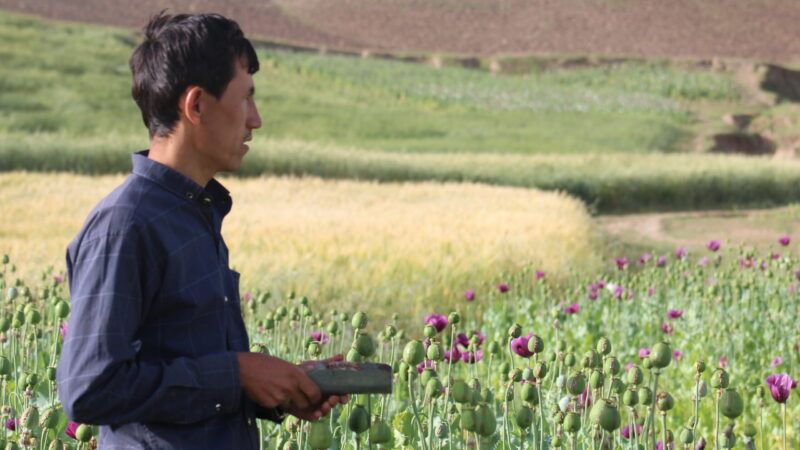Opium Suppression in Afghanistan Was a US-led Failure
The basics of supply and demand still applied.

No single factor can explain the recent swift collapse of the U.S.-backed Afghan government. But one underappreciated mistake has been Washington's long-running effort to suppress the cultivation of opium poppies in Afghanistan and, in turn, the production of heroin and other opioids. The campaign most likely had little effect on the amount of poppy grown. Instead it shifted cultivation to Taliban-controlled territories, bolstering the militia's revenues.
According to the United Nations Office on Drugs and Crime (UNODC), Afghanistan accounted for 85 percent of global opium production in 2020. Poppies are a labor-intensive crop, perfectly suited to a country with a large agrarian population and few off-farm income opportunities. Poppy also thrives in Afghanistan's soil and climate conditions, as well as its weak governance and corruption.
American efforts to suppress poppy cultivation, either through direct eradication or through incentives to grow other crops, failed to account for the basics of supply and demand. Suppression policies focus on shrinking supply, which means a fixed quantity of opium will become more expensive to produce. These policies involve a mix of threats to destroy poppy fields and the provision of resources (such as fertilizers) to encourage farmers to cultivate other crops. But if demand is not very sensitive to price increases, the quantity demanded will change little in response to the reduction in supply.
It is likely, for two reasons, that the demand for opium is not very sensitive to price. First, research finds consumer demand to be modestly elastic. Second, and more importantly, "farm-gate" prices of opium account for a small share of traffickers' costs. Smuggling opiates to retail markets entails high risks and large costs, such as dealing with law enforcement, paying bribes, and more. As a result, increases in the price of opium sold by farmers are unlikely to significantly dent traffickers' bottom lines, enabling them to absorb higher prices without curtailing their quantity demanded.
Indeed, recent UNODC reports document that Afghan poppy cultivation has drifted upward since the U.S. intensified efforts to suppress poppy farming around 2005. Afghanistan maintained its key role as the primary supplier of the world's opiates, suggesting those policies were ineffective at curbing opium output.
Suppression efforts not only failed to curb poppy expansion but also shifted production from areas controlled by the Afghan government to territories where the Taliban and other opposition groups had a stronger grip. The Taliban turned this into a growing revenue stream through multiple mechanisms, including a roughly 6 percent tax on opium sales, raking in millions of dollars. Thus, the U.S.-led effort not only failed to curtail opioid supplies but bolstered the Taliban.
The predictable failure of drug-crop suppression policy in Afghanistan, and its unintended but foreseeable consequences, hold a lesson for other efforts to squelch illicit drug supplies. Joint U.S.-Colombian efforts to suppress coca plantations in Latin America, for example, tell a remarkably similar story. As in Afghanistan, paramilitary groups, such as the FARC, took advantage of illicit drug trafficking in areas under their control to bolster revenues, allowing them to continue their fight with the central government.
Alcohol prohibition led to similar effects in the U.S. While the ban may have discouraged drinking to some extent, it was a boon for organized crime. Skirmishes between gangs for control over alcohol distribution, as in the infamous Saint Valentine's Day Massacre, led to murders and corruption.
It is hard to say whether officials will learn the right lessons from the quick demise of the Afghan government. But next time policy makers consider a drug eradication campaign, they should not forget that such efforts not only have a history of failing but can bolster the very groups the government is fighting.
